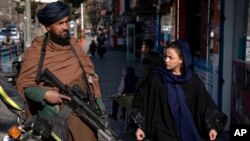The Taliban said Friday that their decision to bar local women from working for the United Nations was an "internal social matter of Afghanistan" that all countries should respect.
The statement came a day after the 15-member U.N. Security Council unanimously passed a resolution condemning the ban and demanding Taliban leaders swiftly end their restrictions on Afghan women's access to education and work.
The resolution, co-sponsored by more than 90 countries, expressed "deep concern at the increasing erosion of respect for the human rights and fundamental freedoms" of Afghan women and girls by the Taliban.
"While taking note of the condemnation of the decision to restrict Afghan women from working with the U.N., we stress that … this is an internal social matter of Afghanistan that does not impact outside states," the Taliban Foreign Ministry said Friday.
"We remain committed to ensuring all rights of Afghan women while emphasizing that diversity must be respected and not politicized," the statement added. It hailed parts of Thursday's U.N. resolution, including "the principle of Afghan-led and Afghan-owned right to self-determination."
The Taliban insisted, however, the humanitarian crisis in war-ravaged Afghanistan "is man-made, driven by economic restrictions" on the country.
"The path to a post-conflict recovery requires the unconditional removal of U.N., multilateral, and unilateral sanctions and restrictions on the country, in addition to the provision of humanitarian and development assistance to the country," the statement said.
Leader rejects easing restrictions
The Taliban reclaimed power in August 2021 from the then-internationally backed government in Kabul as the United States and NATO troops withdrew after almost two decades of involvement in the Afghan war.
The U.S. and other Western nations froze more than $9 billion in Afghan central bank foreign reserves after the Taliban takeover and imposed financial and banking sector sanctions on the country. Washington has since transferred a portion of the frozen resources held in the U.S. to a trust fund in Switzerland to be used strictly for Afghan relief efforts.
Hibatullah Akhundzada, the reclusive Taliban chief, has imposed his strict interpretation of Islamic law, or Sharia, to govern strife-torn impoverished Afghanistan. He has issued a series of edicts banning girls' education beyond the sixth grade and barring most Afghan women from public life and work nationwide.
Akhundzada has rejected calls for easing restrictions on Afghan women, saying he would not allow foreign interference in his Islamic governance.
Last December, the male-only Taliban administration banned female employees of nongovernmental organizations from workplaces and extended it earlier this month to Afghan women working with the U.N.
'Reinvigorate international engagement'
The U.N. resolution against Taliban bans on women came as U.N. Secretary-General Antonio Guterres plans to host a closed-door meeting of special envoys on Afghanistan from several countries in Doha, Qatar, on Monday to discuss what should be done in the aftermath of the intensifying Taliban crackdown on women.
On Friday, U.N. spokesman Stephane Dujarric told reporters in New York that Guterres "has not extended an invitation to the de facto (Taliban) authorities" to attend the two-day meeting in the Gulf state.
Dujarric stressed that recognizing the Taliban would not be "an issue on the table." He shared no further details about the event.
"As we've said, the purpose of the meeting is to reinvigorate international engagement around common objectives for a durable way forward on Afghanistan. To reach unity or commonality of a message — such as human rights — particularly on the issue of women and girls; inclusive governance, countering terrorism, drug trafficking," Dujarric said.
Thursday's U.N. resolution recognized and stressed the need to address "the dire economic and humanitarian situation" facing Afghanistan, including through efforts to restore the country's banking and financial systems.
Afghanistan is the largest humanitarian emergency in the world. U.N. officials estimate 6 million people are one step from famine-like conditions, while more than 28 million more need assistance after years of war and natural disasters.
Margaret Besheer contributed to this report.





